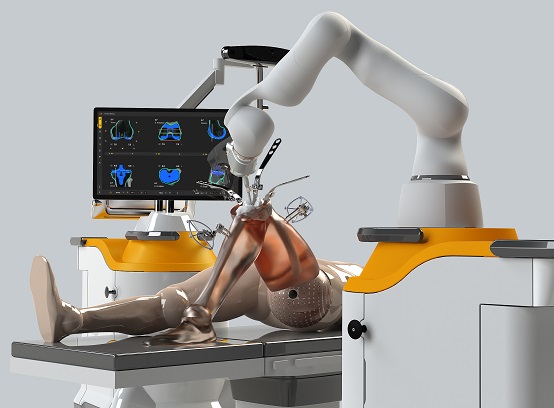Monogram Orthopedics, a startup in joint replacement surgery, announced it has crossed a five thousand Series B investor milestone on crowdfunding platform StartEngine. Aiming to personalize the $19.6B joint replacement market through artificial intelligence, robotics, and 3D printing, More than 1 million knee replacement surgeries are done a year in the United States alone, a figure that is expected to grow to 3.5 million by 2030.
To date, innovation in orthopedics has lagged behind many other surgical specialties. While the rise in personalized medicine has driven advances in numerous fields, progress in orthopedics remains sluggish, with standardized implants and procedures stubbornly persisting as the standard of care.
Unfortunately, this standard in joint replacement surgery doesn’t always serve patients, with approximately 100,000 hip and knee replacement failures every year and 36 percent of patients regretting their procedure altogether. Monogram believes that much of this dissatisfaction and many of these failures and surgical complications can be easily mitigated and are in fact unnecessary with technology advances, such as those they are developing.
Improvements in robotics
Thanks to significant improvements in robotics, innovative new manufacturing techniques like 3D printing of medical-grade titanium alloys and new machine learning (AI) image processing techniques, opportunities to exploit technology and significantly improve patient quality of life are emerging.
Fifty percent of knee replacements will be performed robotically by 2027, a fivefold increase in less than six years. Interestingly, all joint replacement procedures using robotic assistance today continue to use “off-the-shelf” implants. A more personalized approach offers the potential to disrupt the orthopedics field. Monogram aims to do this with a “one-size fits none” model by offering patients an enhanced individualized fit, well suited for each patient’s individual needs.
Constraints
“We started Monogram Orthopedics to build a completely different kind of orthopedics company, free of the constraints that many of the large companies face when trying to innovate,” said Dr. Doug Unis, a board-certified orthopedic surgeon, co-founder and chief medical officer, Monogram Orthopedics and Chief of Quality Improvement at Mount Sinai West. “We are poised to do what no other company has done in the total joint arthroplasty market before – harness technology to build truly personalized implants that fully tap into the power of intelligent robotics.”
Monogram Orthopedics’ proprietary approach to TKA surgeries will address major problems in joint replacement, including mechanical loosening, bone loss, dislocation, ease of revision and fracture. Using the Monogram software platform and product solution architecture, surgeons will be able to design optimized implants that improve stability and physiological loading.
Implants
The company’s research suggests that implants can be inserted into the patient’s anatomy with more precision and notable improvement. In a laboratory test at the University of Nebraska Medical Center, a procedure was performed benchmarking against a competitor’s technology, which is one of the most clinically and commercially successful knees on the market, and showed the competitive product had up to 630% more micromotion than the Monogram implant placed with their surgical robot.

